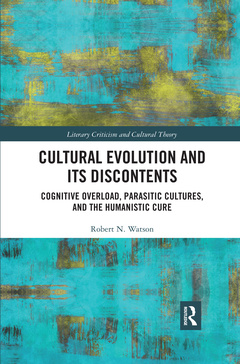Cultural Evolution and its Discontents Cognitive Overload, Parasitic Cultures, and the Humanistic Cure Literary Criticism and Cultural Theory Series
Auteur : Watson Robert

People worry that computers, robots, interstellar aliens, or Satan himself ? brilliant, stealthy, ruthless creatures ? may seize control of our world and destroy what?s uniquely valuable about the human race. Cultural Evolution and its Discontents shows that our cultural systems ? especially those whose last names are "ism" ? are already doing that, and doing it so adeptly that we seldom even notice. Like other parasites, they?ve blindly evolved to exploit us for their own survival. Creative arts and humanistic scholarship are our best tools for diagnosis and cure.
The assemblages of ideas that have survived, like the assemblages of biological cells that have survived, are the ones good at protecting and reproducing themselves. They aren?t necessarily the ones that guide us toward our most admirable selves or our healthiest future. Relying so heavily on culture to protect our uniquely open minds from cognitive overload makes us vulnerable to hijacking by the systems that co-evolve with us.
Recognizing the selfish Darwinian functions of these systems makes sense of many aspects of history, politics, economics, and popular culture. What drove the Protestant Reformation? Why have the Beatles, The Hunger Games, and paranoid science-fiction thrived, and how was hip-hop co-opted? What alliances helped neoliberalism out-compete Communism, and what alliances might enable environmentalism to overcome consumerism? Why are multiculturalism and university-trained elites provoking working-class nationalist backlash? In a digital age, how can we use numbers without having them use us instead?
Anyone who has wondered how our species can be so brilliant and so stupid at the same time may find an answer here: human mentalities are so complex that we crave the simplifications provided by our cultures, but the cultures that thrive are the ones that blind us to any interests that don?t correspond to their own.
Robert N. Watson (B.A. summa cum laude from Yale, Ph.D. in English with Highest Honors from Stanford) taught at Harvard before moving to UCLA, where he has been Chair of the Faculty of Letters and Science and Vice-Provost for Educational Innovation, and is now Distinguished Professor of English. He is the author of prize-winning scholarly books, and poems in the New Yorker and many other journals. He has been awarded Guggenheim and NEH fellowships, as well as visiting fellowships at Trinity College, Cambridge, and Christ Church College, Oxford, and prizes for excellence in teaching and public service.
Date de parution : 01-2020
15.2x22.9 cm
Date de parution : 11-2018
15.2x22.9 cm
Thèmes de Cultural Evolution and its Discontents :
Mots-clés :
Blue Guitar; humanistic education; Young Men; Darwinian functions; Crystal Skull; neoliberalism; Cognitive Overload; cultural systems; Cellular Automata; artistic creativity; Captain America; ISIS Caliphate; Vice Versa; ISIS Recruit; Agent Based Modeling; Play Things; Jacques De Gheyn; Foreign Broadcast Intelligence Service; HAL; Strange Attractor; Occupy Wall Street; Hyperactive Agent Detection Device; Selfish Meme; Superb; Overburdens; Bug’s Life; Digital Humanities; Female Genital Cutting; Feed Back; Eusocial Insects



